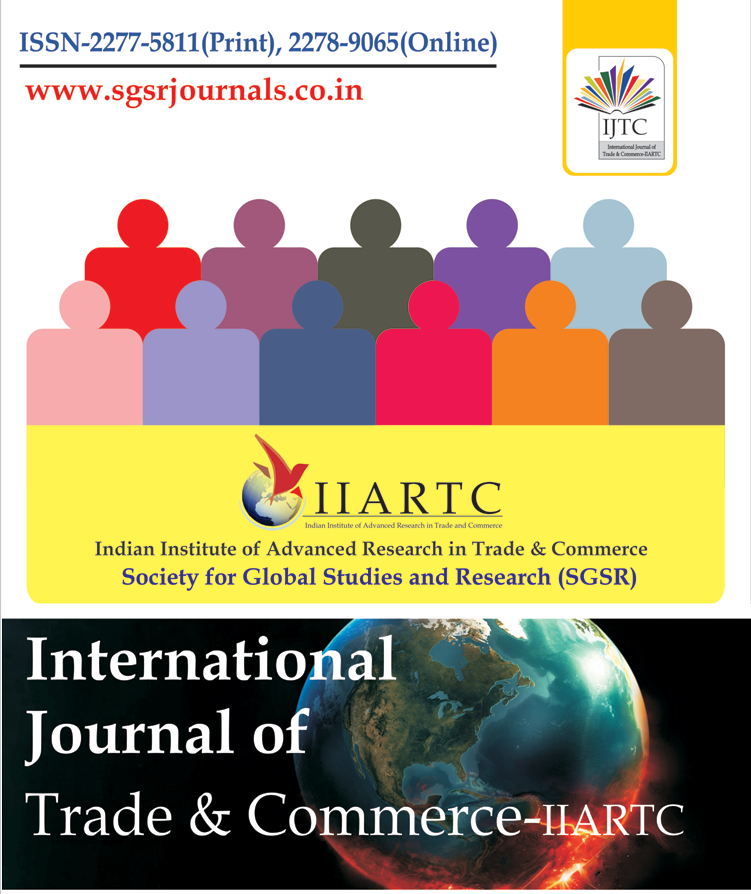Home ⇨ International Journal of Trade & Commerce-IIARTC

International Journal of Trade & Commerce-IIARTC
Impact Factor (IF):5.135 (COSMOS), IF:7.249 (ISRA), IF:3.721 (ISI)
ISSN:2277-5811 (P), ISSN:2278-9065 (O)
Frequency: Half Yearly
Social Policy Imperatives: Addressing Gaps in Skills and Education to Ameliorate Child Labour in Bangladesh
Child labour hampers social equality and threatens their future interest. The last two decades represented a slowing down of the global pace of reduction in child labour. Moreover, the pandemic and wars, including economic crises over the past years have further stalled progress toward the goal of eliminating the worst forms of child labour. For this country, a disturbing fact is substantial rise in the figure of employed children in the age group of 12-13 years—from 0.04 million in 2013 to 0.59 million in 2022—and their involvement in perilous work, which has more than doubled in the last ten years. The Bangladesh Bureau of Statistics’ National Child Labour Survey of 2022 documents that out of 39.96 million children, 1,068,212 children (aged 5 to 17 years) are in remunerated or low-paid work, and amongst them, 60 percent are involved in hazardous child labour. In the interest of sustaining development gains, child labour needs to be cogently addressed. This study suggests a paradigm shift within a social policy imperative, due to the absence of an implemented and effective social protection strategy (notwithstanding the National Social Security Strategy that could successfully encompass this group) No implementation strategy has been articulated in NSSS. This study devises solutions that take into cognizance the socio-economic and structural constraints, for amelioration of child labour in Bangladesh. Also, policies have been recommended here: by drawing upon NGO initiatives in Bangladesh, as well as author’s projection of innovative strategies to keep children attentive and keen. An idea of best practice from RSBY (India) and ID cards for support of street children and poor, has been given. A child centered development for improving their skills and education, leading to entry into trading, or remunerative activity through placements, have been delved into, for quick improvements in their situation. It would assist in developing more sensitive policies and its implementation, in future.
Author:Anwara Begum*
Abstract:Child labour hampers social equality and threatens their future interest. The last two decades represented a slowing down of the global pace of reduction in child labour. Moreover, the pandemic and wars, including economic crises over the past years have further stalled progress toward the goal of eliminating the worst forms of child labour. For this country, a disturbing fact is substantial rise in the figure of employed children in the age group of 12-13 years—from 0.04 million in 2013 to 0.59 million in 2022—and their involvement in perilous work, which has more than doubled in the last ten years. The Bangladesh Bureau of Statistics’ National Child Labour Survey of 2022 documents that out of 39.96 million children, 1,068,212 children (aged 5 to 17 years) are in remunerated or low-paid work, and amongst them, 60 percent are involved in hazardous child labour. In the interest of sustaining development gains, child labour needs to be cogently addressed. This study suggests a paradigm shift within a social policy imperative, due to the absence of an implemented and effective social protection strategy (notwithstanding the National Social Security Strategy that could successfully encompass this group) No implementation strategy has been articulated in NSSS. This study devises solutions that take into cognizance the socio-economic and structural constraints, for amelioration of child labour in Bangladesh. Also, policies have been recommended here: by drawing upon NGO initiatives in Bangladesh, as well as author’s projection of innovative strategies to keep children attentive and keen. An idea of best practice from RSBY (India) and ID cards for support of street children and poor, has been given. A child centered development for improving their skills and education, leading to entry into trading, or remunerative activity through placements, have been delved into, for quick improvements in their situation. It would assist in developing more sensitive policies and its implementation, in future.




